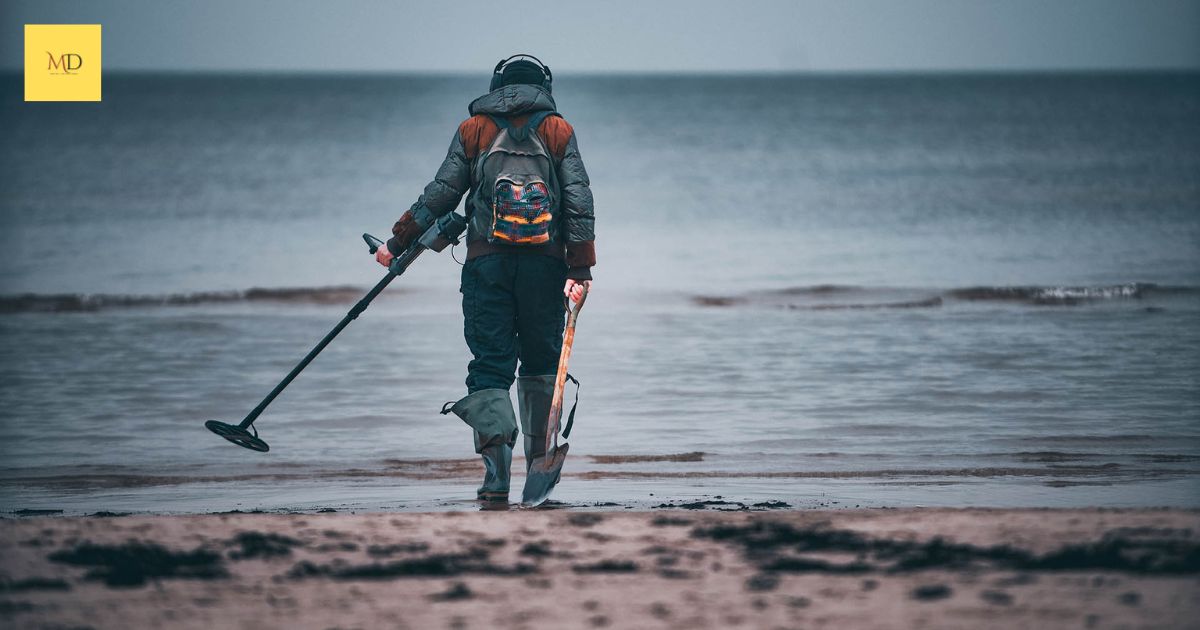A metal detector is a device that can locate metal objects hidden beneath the ground or in other materials. It works by emitting electromagnetic waves and detecting changes in their magnetic fields when they interact with metal. Metal detectors are commonly used for treasure hunting, security screening, and archaeological purposes. They come in various sizes and designs, making them versatile tools for different applications.
Ever wondered if you can bring a metal detector on a plane? Well, you’re not alone! It’s a question that many curious travelers have pondered. In this article, we’ll unravel the mystery and provide you with all the information you need. So, if you’re planning your next flight and want to know the answer, keep reading for a hassle-free journey.
Bringing a metal detector on a plane is generally allowed, but it must be packed in your checked baggage, as it may resemble a prohibited item in your carry-on. Always check with your airline and the Transportation Security Administration (TSA) guidelines to ensure compliance and a smooth travel experience.
Understanding Airport Security Regulations
Understanding airport security regulations is essential for travelers to ensure a hassle-free journey. These regulations encompass various rules and guidelines aimed at maintaining the safety and security of passengers and aircraft. When it comes to items like metal detectors, it’s important to note that they are typically not allowed in carry-on luggage due to their potential resemblance to prohibited items on X-ray scans.
The best practice for travelers is to always check with their specific airline for any unique policies and guidelines, as well as to familiarize themselves with the latest information provided by the Transportation Security Administration (TSA). By understanding and adhering to these airport security regulations, passengers can contribute to a more efficient and secure travel experience for themselves and their fellow travelers.
Contacting Your Airline
When it comes to traveling with a metal detector on a plane, getting in touch with your airline is a crucial step. Each airline may have its own set of rules and regulations concerning the transportation of such equipment. By reaching out to them in advance, you can clarify their specific policies, procedures, and any necessary precautions. This proactive approach ensures that you are well-prepared and informed about how to handle your metal detector during your journey.
Contacting your airline is especially important if you have any concerns or questions about the proper packaging of your metal detector, which is typically required to be placed in your checked baggage due to its resemblance to restricted items.
TSA Guidelines and Screening Process
The Transportation Security Administration (TSA) has established clear guidelines and a thorough screening process for travelers who wish to bring a metal detector on a plane. When packing a metal detector in your checked luggage, it’s important to remember that it must not be in your carry-on bag as it can resemble prohibited items on the X-ray scanner. TSA agents are trained to identify potential security risks, and bringing a metal detector in your carry-on could lead to unnecessary delays and further inspections.
During the screening process, it’s advisable to inform TSA officers about the presence of your metal detector in your checked luggage. This proactive communication can help ensure a smoother experience at security checkpoints. By following the TSA guidelines and cooperating with the screening process, you can help maintain safety and security while traveling with your metal detector.
Tips for a Smooth Travel Experience

When it comes to ensuring a smooth travel experience with your metal detector, a few key tips can make a world of difference. Proper packaging is crucial – always place your metal detector in your checked baggage to avoid any confusion or concerns at airport security. Additionally, it’s wise to carry a copy of the TSA regulations related to metal detectors to address any questions that may arise during screening.
To further streamline your travel experience, remember to arrive at the airport with ample time to spare, as you might need additional screening for your checked baggage. Be patient and cooperative during the security screening process, and inform the TSA officers about your metal detector in advance. Following these simple guidelines and maintaining a courteous demeanor will not only help you travel smoothly but also ensure that your metal detector is securely stowed in your checked luggage, ready for your next adventure.
Traveling with Metal Detectors for Hobbyists and Professionals
Traveling with metal detectors holds different significance for hobbyists and professionals alike. Hobbyists often carry their detectors to explore new locations in search of treasures like coins, jewelry, or relics. For them, it’s a recreational pursuit that adds an element of adventure to their travels. They must ensure their detector is securely packed in checked baggage to adhere to airport regulations while keeping their excitement alive for potential discoveries at their destination.
On the other hand, professionals, such as archaeologists and researchers, rely on metal detectors as critical tools in their work. These detectors are essential for uncovering historical artifacts and conducting surveys at archaeological sites. Professionals should coordinate with airlines, ensuring their detectors are properly transported and safeguarded, as their equipment plays a pivotal role in preserving our historical heritage.
International Travel Considerations
When it comes to international travel with a metal detector, there are some important considerations to keep in mind. First and foremost, it’s crucial to research the regulations and laws of your destination country. Different nations have varying rules concerning the import and use of metal detectors, and failing to comply can lead to legal issues and confiscation of your equipment. Additionally, you should be aware of customs and declarations procedures, as you may need to declare your metal detector when entering a foreign country.
For professionals like archaeologists and researchers who require metal detectors as part of their work, international travel considerations take on added importance. When conducting fieldwork in different countries, it’s crucial to establish partnerships and obtain the necessary permits well in advance. Each nation may have its own set of rules for archaeological excavations, so thorough research and collaboration with local authorities are essential.
Treasure Hunters
Treasure hunters are adventurous individuals with a passion for uncovering hidden gems and historical artifacts. Whether searching for lost relics in remote locations, scouring the beaches for buried treasures, or exploring historical sites, these enthusiasts thrive on the thrill of discovery. Armed with metal detectors, shovels, and a keen eye, treasure hunters dedicate their time and effort to unraveling the mysteries of the past.
The hobby of treasure hunting can be both exciting and educational. It not only offers a chance to unearth valuable items but also provides insights into history, culture, and the lives of those who came before us. Many treasure hunters enjoy sharing their discoveries with the world, contributing to the collective knowledge of our past and preserving artifacts for future generations to admire and study.
Archaeologists and Researchers
Archaeologists and researchers often find themselves in a unique position when it comes to traveling with metal detectors. These professionals rely on metal detectors to help uncover historical artifacts and hidden treasures buried beneath the earth’s surface. Whether they are excavating ancient ruins, exploring shipwrecks, or conducting archaeological surveys, metal detectors are invaluable tools for pinpointing metal relics that hold clues about our past.
Furthermore, these professionals need to strike a balance between utilizing advanced metal detection technology and practicing responsible archaeological ethics. Their work contributes significantly to our understanding of history and culture, making it imperative that they handle their metal detectors with care, respect local laws, and ensure the preservation of historical artifacts for future generations to study and admire.
FAQ, S
Can I travel on a plane with a metal detector?
Yes, you can travel on a plane with a metal detector, but it should typically be packed in your checked baggage to comply with airline regulations and security measures. Always check with your airline and the Transportation Security Administration (TSA) for specific guidelines to ensure a hassle-free travel experience.
Can you take a hand held metal detector on a plane?
Yes, you can typically take a handheld metal detector on a plane, but it’s advisable to pack it in your checked baggage to avoid any confusion at security checkpoints. Always verify with your airline’s specific policies and consult the Transportation Security Administration (TSA) guidelines for a hassle-free travel experience.
What can set off metal detector at airport?
A variety of common items can set off a metal detector at an airport or on a plane, including metal jewelry, watches, belts, coins, keys, and even underwire bras. Additionally, medical implants, like pacemakers or joint replacements, may trigger alarms, so it’s important to inform airport security about such devices for a smoother screening process.
Conclusion
The ability to bring a metal detector on a plane depends on understanding and adhering to airport security regulations. It’s essential to know the specific guidelines of the airline you’re traveling with and to prepare your metal detector properly for checked baggage. Ensuring a hassle-free experience also involves complying with Transportation Security Administration (TSA) rules and communicating openly about any medical implants that may set off metal detectors.
For hobbyists, researchers, and professionals alike, traveling with metal detectors can be an exciting part of their work or leisure. By staying informed, cooperating with airport and security personnel, and respecting local regulations at your destination, you can continue to enjoy the use of these valuable tools while exploring the world and uncovering its hidden treasures. Safe and respectful travel ensures that both the skies and the ground are open for adventure and discovery.











